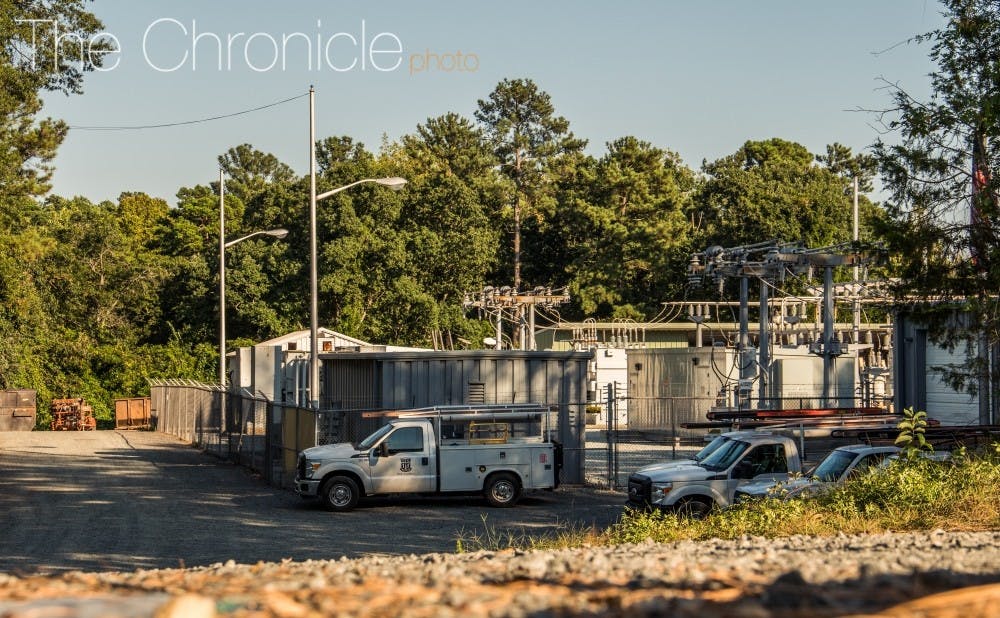Following student and faculty pushback, Duke Energy's plans for a combined heat and power plant have been delayed.
The company has requested that the North Carolina Utilities Commission postpone a hearing on the proposed plant from Jan. 24 to late spring. The filing notes that “the University’s administration has indicated that it needs more time to work with University stakeholders regarding the role of the CHP [combined heat and power plant] in the broader context of the University's sustainability goals."
Because of this, the filing noted, the University's internal sustainability and Board of Trustees verification processes will not be complete in time for the Jan. 24 hearing. The filing requested that the process restart in May 2017 after Duke has had time to "address internal stakeholder concerns."
"Duke Energy continues to be very optimistic about the CHP Facility, and believes that distributed generation assets such as combined heat and power provide a cost competitive generation asset for North Carolina electric customers, create thermal energy value to the host site and reduce CO2 emissions for the State of North Carolina," the filing read.
The $55 million, 21-megawatt combined heat and power plant would be owned and operated by Duke Energy Carolinas, a subsidiary of Duke Energy. The facility would be capable of reducing the University’s energy-related carbon dioxide emissions by approximately 25 percent. In addition to producing electricity, the combined heat and power facility would use waste heat to produce thermal energy and steam, which would be sold back to the University.
Michael Schoenfeld, vice president for public affairs and government relations, told The Chronicle in September that the plant would be built to the east of the Blue Zone parking lot, near the existing Duke Energy substation and the University's chilled water plant, and would take approximately 18 months to build. The University supports Duke Energy's request for a delay, Schoenfeld wrote in an email Monday evening.
The plant's supporters argued that building a CHP plant on campus will reduce emissions and the University's energy bill as well as strengthen Duke's ability to generate power during a regional power outage. However, community members have raised concerns about about the plant’s broader environmental impact on North Carolina.
In an open letter to the Duke community, President Richard Brodhead wrote that energy reliability and security were the main reasons the University desires to build the plant, especially given the operations of Duke Hospital. He also argued that CHP plants are known for their efficiency and effectiveness, and that using natural gas would be cleaner than the coal used in the past.
"This is, literally, a matter of life and death for the patients in our hospitals and is critical to the cumulative years of research that rely on carefully maintained laboratory conditions," he wrote.
However, the Duke Climate Coalition—as well as other community organizations such as NC WARN—have been skeptical of these claims. Sophomore Claire Wang, president of DCC, noted that the plant's impacts on the broader North Carolina community needs to be considered. Although DCC was not consulted on Duke Energy's request to delay the proceedings, she said it was the result of efforts by DCC to raise awareness throughout the semester.
"Duke Climate Coalition has been pushing the administration to suspend further negotiations on the gas plant until a thorough analysis of the gas plant has taken place and a consideration of all alternative energy options has happened," she said.
Wang said the details of the University's internal stakeholder process are yet to be finalized, but they will likely be conducted in the Campus Sustainability Committee. That committee has working groups dedicated to fulfilling the University's Climate Action Plan—which promises Duke will be carbon neutral by 2024. Wang said she would be on the working group dealing with the CHP plant, alongside other interested faculty stakeholders.
In opposition to the plant, Wang argued that "a new investment in fossil fuels will inevitably have a lifetime of 35 to 40 years," which she said was not in the University's best interest. Moving forward, Wang said there needs to be a "good faith" analysis of potential alternatives and the plant's consequences. DCC does not currently have a stance on who should conduct this analysis, she said, just that it should be done responsibly and transparently.
"It's too early to say what the outcome of that process is," she said, when asked if there was a scenario in which DCC would be willing to support the plant. "There is a way where it's done and is responsible, and we would respect the decision ultimately made, and there's also a potential route that replicates the same types of problems right now."
Wang also urged the University to make its decision by the end of the academic year, because by May 2017—Duke Energy's requested start date for regulatory hearings on the project—students will have left campus for the summer.
Get The Chronicle straight to your inbox
Sign up for our weekly newsletter. Cancel at any time.

